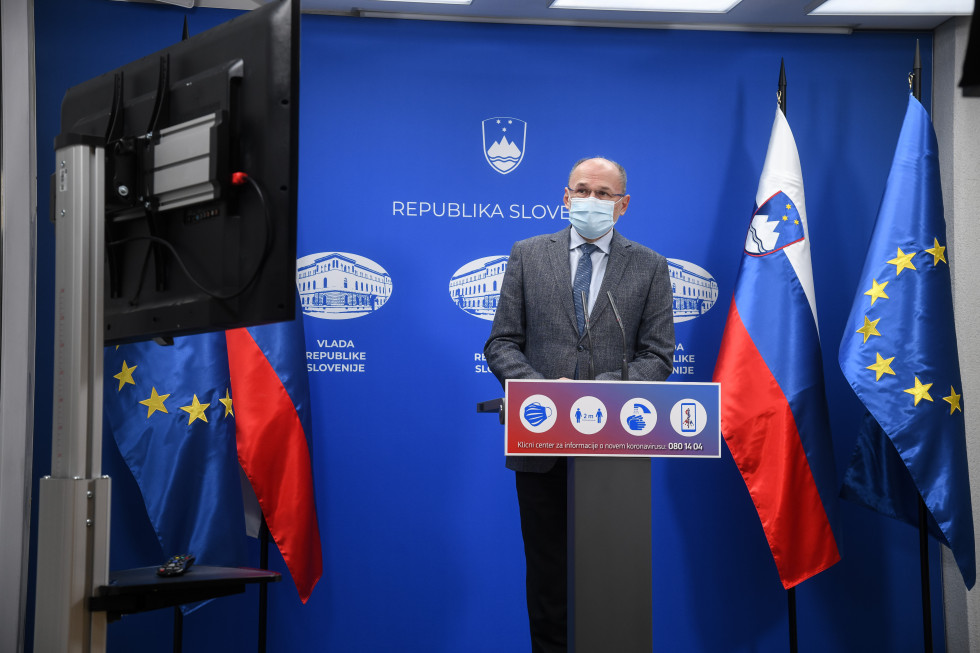Government extends measures
Mr Kacin said that 7391 coronavirus tests were carried out yesterday, of which 1767 were positive, and the share is at 23.9 percent. 32 people died in hospitals and 14 in retirement homes, a total of 46 persons. 1302 patients needed hospital care yesterday, 5 more than on Tuesday. 91 patients in total were discharged from hospitals. The number of persons requiring intensive care increased yesterday. A total of 215 patients needed such care, 13 more than on Tuesday. There are 348 patients currently at UKC Ljubljana, 4 fewer than the day before. There were 3 fewer patients requiring intensive therapy, a total of 60 patients
The two week incidence per 100,000 people equals 956. The Mura region still has the highest incidence at 1576, followed by Carinthia at 1538. 7 regions (Coastal-Karst, Gorizia, Littoral-Inner Carniola, Central Slovenia, Lower Sava, Upper Carniola, and Central Sava) recorded a two week incidence below 1000. There are currently 20,041 active Covid-19 cases in the country
The following municipalities stand out in terms of the number of active cases: Celje 43, Kamnik 46, Kranj 44, Slovenska Bistrica 45, Velenje 55, Zagorje ob Savi 31, Koper 32, Domžale 27, and the same number of infections was also recorded in Trebnje. 24 infections were recorded in Nova Gorica, 21 in Črnomelj and Trbovlje, and 22 in Žalec. Ljubljana had 205 new infections and Maribor had 9
200 retirement home residents managed to overcome Covid in the second wave, 110 of them yesterday, and more than 1000 employees, 40 of them yesterday. We recorded 178 newly infected residents and 90 employees on Wednesday. The following retirement homes had the most new positives: DSO Trebnje 19, Dom starejših na Fari, Prevalje 12, Horjul 11, Ptuj 12, Lendava 27 and DSO Izlake 12.
In today’s session, the government familiarised itself with the assessment of the working group for the containment and management of the Covid-19 epidemic at the Ministry of Health, and decided, as Mrs Magajne explained, to extend the measures and restrictions listed in the independent public announcement following the session of the government, by seven or fourteen days.
The main reason behind such a decision is the intensive circulation of the virus among the population. We recorded a slight drop in positive cases yesterday, however the fact that there are 1302 hospitalised patients today, of whom 215 need intensive care, shows us that this is the largest daily burden for the healthcare system to date. Until the number of hospitalised patients reduces significantly, no lifting of the measures are to be expected. The government did adopt a decision under which the Ministry of Health needs to prepare a plan for lifting the measures by the next regular session of the government on Thursday.
Mrs Magajne continued with the presentation of the published order in the Official Gazette yesterday, on the changes and amendments of the decree on the temporary measures in the field of organising activities due to the management of Covid-19, which among other things, governs the implementation of rapid tests in social institutes as well.
Healthcare providers and social institutes will therefore need to carry out regular tests of persons working in their institutions. Tests are mandatory if the provider detects an infection, and must be carried out at least once a week within each organisational unit of the provider in which the infection was identified. The order states that tests are carried out from the moment of the infection, and at least 14 days following the last known infection in the organisational unit.
Tests are carried out on the level of the entire social institution. Tests are not mandatory for persons working for them and who have recovered from the infection in the last three months. Tests are done by the provider or social institution itself. If they do not have the authorisation or the capacity to carry out the tests, then it shall connect with another provider or social institution which has the authorisation for such tests. Rapid antibody tests are to be used for the tests. The order also stipulates that tests and reports are to be implemented gradually, and in full by 7 December.
Certain homes are already using the rapid tests. One third of the homes that have a sufficient amount of staff may carry out the tests themselves, while all other homes will be able to carry them out with the help of clinics or the special mobile unit. The formation of the latter will take some days, because appropriate staff need to be ensured.


